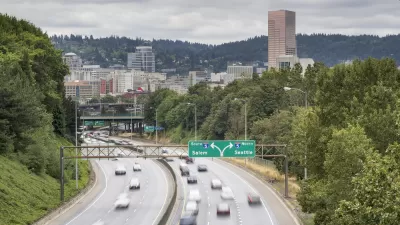The I-5 Rose Quarter project has proven controversial throughout the study and planning process, and now it's losing key local political support.

"A state project to expand Interstate 5 through the Rose Quarter lost major support Tuesday after a community nonprofit leading an effort to revitalize the nearby Albina neighborhood and city, county and regional elected officials announced they no longer support the plan," reports Everton Baily.
The Albina Vision Trust was the organization that withdrew its support for the plan. "The nonprofit’s mission is to help restore and revitalize the Albina neighborhood that in the last century was home to 80% of Portland’s Black population before most of those residents were displaced through eminent domain, gentrification and racism," explains Bailey.
The Albina Vision Trust has been voicing concerns about the project since January, and organization said in its statement that the plan hadn't evolved since that time.
Since the Albina Vision Trust withdrew its support, "Portland Bureau of Transportation Commissioner Chloe Eudaly and Portland Mayor Ted Wheeler have both pulled their support as well. This means ODOT is left trying to complete a controversial mega-project that doesn’t have support from the very city it would be built in," according to a separate article by Jonathan Maus.
After those local leaders withdrew their support, Oregon Governor Kate Brown chimed in too.
"Gov. Kate Brown said Wednesday that the planned widening of Interstate 5 through the historic Albina neighborhood that was once home to nearly 80% of Oregon’s Black population will not happen without the support of Portland’s Black community," reports Betsy Hammond, in yet another article tracking the shifting political landscape for the project.
Brown stopped short, however, of withdrawing support from the Rose Quarter project, "which the Oregon Legislature authorized and agreed to fund under a mammoth 2017 transportation package."
Previous Planetizen coverage of the I-5 Rose Quarter project.
FULL STORY: Community nonprofit, Portland-area elected officials say they no longer support I-5 Rose Quarter project

Maui's Vacation Rental Debate Turns Ugly
Verbal attacks, misinformation campaigns and fistfights plague a high-stakes debate to convert thousands of vacation rentals into long-term housing.

Planetizen Federal Action Tracker
A weekly monitor of how Trump’s orders and actions are impacting planners and planning in America.

In Urban Planning, AI Prompting Could be the New Design Thinking
Creativity has long been key to great urban design. What if we see AI as our new creative partner?

King County Supportive Housing Program Offers Hope for Unhoused Residents
The county is taking a ‘Housing First’ approach that prioritizes getting people into housing, then offering wraparound supportive services.

Researchers Use AI to Get Clearer Picture of US Housing
Analysts are using artificial intelligence to supercharge their research by allowing them to comb through data faster. Though these AI tools can be error prone, they save time and housing researchers are optimistic about the future.

Making Shared Micromobility More Inclusive
Cities and shared mobility system operators can do more to include people with disabilities in planning and operations, per a new report.
Urban Design for Planners 1: Software Tools
This six-course series explores essential urban design concepts using open source software and equips planners with the tools they need to participate fully in the urban design process.
Planning for Universal Design
Learn the tools for implementing Universal Design in planning regulations.
planning NEXT
Appalachian Highlands Housing Partners
Mpact (founded as Rail~Volution)
City of Camden Redevelopment Agency
City of Astoria
City of Portland
City of Laramie




























